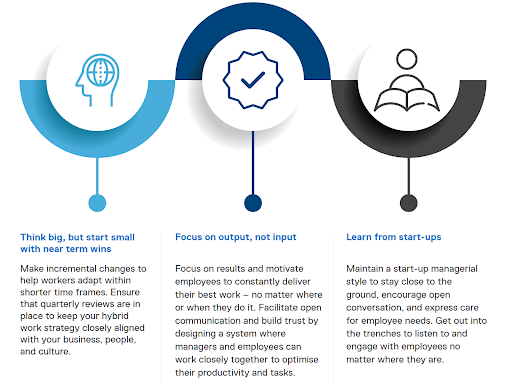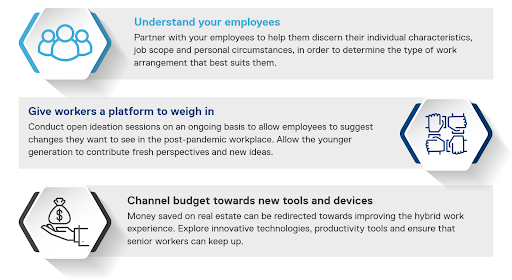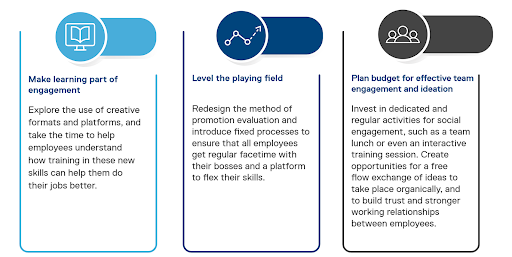
Dell Technologies says these 3 things are needed for a successful hybrid workforce
At the onset of the pandemic in early 2020 as the world grappled with lockdowns, organisations and people started working from home. Now, as lockdowns are being rescinded and the world is gradually returning to some sense of normalcy, companies are gradually introducing options for employees to return to the office in tandem with working from home in an attempt to create a hybrid work culture.
Implementing such a radical change in company culture naturally creates its own sets of challenges, which has resulted in companies experimenting just what combination of processes and leadership is needed to create a successful and sustainable hybrid work culture. Dell Technologies, building off their prior research and findings in remote work processes may have a decisive answer.
“With work today no longer anchored to a single place and moment in time, organisations must focus on outcomes and be ready to help their employees realise both their professional and personal roles effectively regardless of where they work. While eight in 10 employees across APJ expressed readiness for long-term remote work, there are still a number of factors that need to be addressed,” said Jean-Guillaume Pons, Senior Vice President and General Manager, Client Solutions Group, Asia Pacific, Japan and Greater China, Dell Technologies.
“As we move into the future of work, we hope these insights and learnings can help organisations shape a hybrid, ready-for-anything workforce in line with their business needs,” adds Pons.
“The pivot to remote work has brought about its own set of challenges and to navigate them now and into the future, organisations require the right IT infrastructure to accommodate new ways of working seamlessly and securely, but equally – and increasingly – it also means embracing a culture shift that places the wellbeing of employees at the fore,” said Mak Chin Wah, Country Manager, Malaysia, and General Manager, Telecom Systems Business, South Asia, Dell Technologies.
“Malaysians are prepared to work remotely for the long term and look to their employers for greater support as the hybrid work future takes shape – the onus is on organisations to create a conducive environment where employees can remain engaged and productive,” adds Mak.
Building off the Dell Technologies Remote Work Readiness that was conducted earlier this year, the brand shared additional findings in their latest research paper that investigated the role of organisations in designing a hybrid work future and offers recommendations and viable solutions from four experts from all over the world.
This new research paper dubbed Leading the Next Hybrid Workforce was written with input from Mallory Loone, co-founder of learning and engagement firm Work Inspires in Malaysia, Australian RMIT lecturer Dr Julian Waters-Lynch, Japan-based management consultant Rochelle Kopp, as well as NUS lecturer Dr Rashimah Rajah from Singapore.
Based on the findings of these four experts, Dell Technologies says 3 imperatives are needed for a successful hybrid work culture to ensure a sustainable hybrid work environment. These 3 overarching imperatives are Leadership, Structure and Culture.
Leading the Next Hybrid Workforce Imperative 1: Leading with empathy and intent
Table of Contents
In the report, the 4 experts concluded that leaders must lay down innovative and fundamental changes in their organisations to pave the way forward but also temper this with empathy and compassion to address the potential challenges that employees will encounter with remote work scenarios. Leaders must also establish trust with employees and focus on an outcomes-driven mindset to avoid micromanagement.

Some of the more common challenges faced include the lack of in-person communication and its commensurate lack of social cues and camaraderie when communicating with fellow employees over the proverbial office water cooler. Another growing challenge are the decreasing boundaries between professional and personal lives; if your commute to the office is a mere two steps, it’s a lot harder to disconnect and many organisations expect work from home employees to put in even more time on account of the benefit of not having to commute to work.
Leading the Next Hybrid Workforce Imperative 2: Creating a thoughtful hybrid work structure
In the new normal that is being embraced by organisations and employees alike, its clear that every scenario and every employee’s circumstances need to be approached with an emphatic, case-by-case basis in order to gain the most benefits from a hybrid work scenario. Unfortunately, slapping down a rule book and a one-size-fits-all set of rules isn’t going to work and employers need to understand their employees’ work preferences to gain the most benefit from a hybrid work environment; not everyone is a social butterfly after all.

To succeed, the four experts conclude that open communication is needed to understand expectations from both employees and employers and then both sides need to find a balance between regularity, work goals and flexible work arrangements to maintain social interaction and company culture.
Leading the Next Hybrid Workforce Imperative 3: Making culture-building deliberate
Back before the pandemic, employees in larger organisations were immersed in company culture both directly and indirectly through interaction with fellow employees, through orientation programmes, induction and acculturation. But with face-to-face communication a rarity at best, more effort needs to be done to inculcate key company values to employees.

The paper concluded that more efforts need to be taken towards culture building in order to retain creativity, innovation and collaboration while ensuring that there is no split in culture, values or any potential imbalance in any way between office-based and home-based employees.
To that end, the four experts suggest to allocate unutilised budget that would have been required for daily office expenses, seeing as there’s less need for it, and reallocate it towards programmes that create more rapport, better working relationships and engagement with fellow employees such as team building exercises, lunches and the like.
Where can I read the Leading the Next Hybrid Workforce insight paper in full?
The Leading the Next Hybrid Workforce insight paper with complete insights and recommendations by Dell Technologies is available for download and further reading here. For further background into the study, you can also peruse the entirety of the Dell Technologies Remote Work Readiness Index report that is available online for reading on their official site here.
